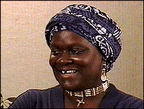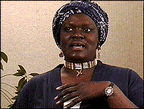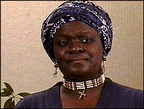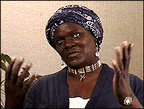![]() Listen
to Bonnie share a cancer experience in her own words. (924 K .au
file)
Listen
to Bonnie share a cancer experience in her own words. (924 K .au
file)

Bonnie was 43 years old when she was diagnosed with breast cancer. She had just quit her job as a nurse and had gone back to graduate school full time. Facing this diagnosis without health insurance was difficult.

Bonnie joined a breast and cervical cancer screening program. She was able to get all of the tests to help diagnose her cancer. Her first biopsy was inconclusive. The second biopsy was positive.

Based on the biopsy information, Bonnie chose to have a lumpectomy followed by radiation. The pathology report from the lumpectomy showed more cancer in her breast. Then she had a mastectomy followed by chemotherapy.

Bonnie's physical recovery progressed at a normal rate, however, her emotional recovery did not progress until she "came out of the closet" and started sharing her breast cancer experiences with others.
Bonnie's Introduction: Life before cancer
I guess I have kind of like a clouded vision of my life style.
Before cancer I was working as a registered nurse and I had a lot of
dreams about what I wanted to do. And was witnessing quite a bit of
spiritual growth so I took a chance when I quit my job, leaving to
pursue going back to school full time, which meant no benefits. I
just thought I would be able to continue on and stay relatively
healthy. And I had just completed a year and a semester at Michigan
State University before I found out that I had cancer.
Bonnie's Introduction: I wasn't sure if it was a lump
I did breast self-exams, mostly every month, sometimes skipping
months . . . I noticed that there was somewhat of a change in my left
breast and I thought, well, I need to really check this out. I really
didn't know exactly if it was a lump or not, and I went down to the
American Cancer Society and got their models and I was feeling on the
models to see, okay, does any stuff like I feel here feel the same
way this on my breast. And it was. I thought "I think I got
cancer."
Bonnie's Introduction: I found a clinical trial
I tried to get into a clinical trials program that my clinical
instructor at Michigan State had told me about. And I searched, and
searched, and searched, and just when I was thinking about going into
the other regular treatment program, my partner said "Well, if that's
the thing that you really wanted to do, maybe you should do that just
to make sure you have your own satisfaction about this thing." So I
did. I pursued that and I was very happy that I did because the
program that I am now in gives you the cutting-edge treatment for the
cancer that I have, which is Stage Two breast cancer. And it also
randomizes me to an experimental drug which helps your blood cells to
rebound faster, because one of the things that the chemotherapy does
is to not only kill the cancer cells but it affects your whole immune
system and your ability for your blood to do the things that it needs
to do. And we found out that has helped.
Bonnie's Introduction: I have many hobbies
I have quite a few hobbies. I took some video production courses
and did some things around the community. I did a public service
announcement for our health department entitled Beat the Flu. Did
video taping production around African American health care, and
youth involved in sexuality. And I like various kinds of music. I
like to read and think of myself sometimes as a writer. I walk quite
a bit. And probably something that's different about me is I'm a
vegetarian. Sometimes I wonder how can that be I got all these pounds
hanging on me, but yes indeed I am. Been a vegetarian for quite some
time.
Bonnie's Introduction: I did not know what to expect
When I went into the hospital, and all my family members, of
course, they were like devastated. And I know that cancer has been
something talked about so much these days. That now people don't
think its so devastating any more, but to me it was like really
devastating because I didn't know anything at that time. I didn't
know what to expect, I didn't know what my survival rates would be, I
didn't know what kind of cancer I had, . . . cancer. I was beginning
to tell a few of my relatives. I hadn't told any of my friends. And
there is a woman right here to the American Cancer Society that I got
in touch with and she just talked a lot about what happened to her.
Then the group that kind of surrounded me were people who are
knowledgeable about the disease or had the experience themselves.
Bonnie's Introduction: Telling the kids was difficult
There was a woman from the American Cancer Society that gave me a
call one day and asked me how I was doing, and I told her what my
biggest concern was, which was not knowing how to tell my kids. It
was really difficult telling the kids, but the American Cancer
Society has a letter that's addressed to your spouse, and other, your
daughter, your son, and it has words on it that talk about what's
happened. And then Dolores and Lenore talked about typical questions
that kids would ask. And everything that they had shared with me were
things that I could share back with them, and that was very
helpful.
![]() Return
to Bonnie's Outline
Return
to Bonnie's Outline
Bonnie's Diagnosis: I met someone who could help
The other thing I had to deal with is not having any health
insurance. How was I going to pay for these things? I had heard about
the breast and cervical cancer screening program. I wanted to have
some sense of privacy when I went through checking out whether or not
I had this disease. And I know that we say things are confidential,
but sometimes things are not confidential. So what I did was I called
my mother and asked her to do some calling for me to find out about
the program, the one in Kalamazoo, Grand Rapids, and possibly one in
Lansing to see exactly what it took to become a patient. And finally,
she gave me some information which really wasn't complete. And then,
I had a class on cultural competency and diversity and low and
behold, this woman who coordinates the program came to the class that
night and was talking about diversity, but also mentioned that she
was a coordinator of this breast and cervical cancer screening
program at the State. And I thought, this is wonderful.
Bonnie's Diagnosis: I was finally examined
And so I talked with this woman who coordinates the program. And
all these things on my mind, I'm trying to get through finals and I
was teaching at the time. Thinking "Do I have cancer in my breast?"
So finally I did have the appointment with the nurse practitioner.
She examined me and she said yeah, there's something there. She was
going to put my next step in terms of getting a mammogram for 2-3
weeks or something, because we're looking at the Christmas holiday.
And decided that it was a distinct enough lump that maybe we could
move the date up. So I wound up getting my mammogram within a week
after being examined. And then they felt some changes that had
occurred and needed to do another follow-up. And the follow-up would
be with the surgeon.
Bonnie's Diagnosis: I didn't feel optimistic
Things I'd read about breast cancer were kind of reassuring. Like,
you know, the mammogram picks up 80% or 85% masses that are seen,
that kind of thing. But even when you have that kind of thing, the
chances are for these masses being cancerous is really low. And I was
thinking in my mind I hope that's true for me, but feeling that it
wasn't true for me.
Bonnie's Diagnosis: The surgeon was sensitive to me
When I went to see the surgeon, he had a medical student with him.
There was a discussion whether or not to go for a surgical biopsy in
the hospital, or have a fine needle biopsy aspiration done in the
office. I'm just really afraid of needles. I don't like to be poked,
and I don't like pain. I had requested some kind of topical
anesthesia. The student was really sort of like, oh, it's no big
deal. But it was really the surgeon that said if that's something
that she wants, make her feel more comfortable. We can do that for
her. And I really appreciated that, and I think for me it just meant
asking for some of the things that you want, sharing some of the
fears that you have, then having a medical provider that was
sensitive to your needs make a big different.
Bonnie's Diagnosis: I had a second biopsy
I had to wind up getting the biopsy over again because the first
one was inconclusive . . . inconclusive. And then when I had the
other done by the surgeon, that one came out to be positive cancer.
And then it was like, well okay, this is not the biggest shock
because this is something that I was expecting, but oh, I wasn't
expecting this. It was difficult to accept that diagnosis.
![]() Return
to Bonnie's Outline
Return
to Bonnie's Outline
Bonnie's Treatment: I read about my options
Then I kept on reading more, and more, and more, and more, finding
out what my treatment options were. And since I had read a lot, I
kind of knew what the treatment options were, but it was to have the
lumpectomy done. The doctor talked about how much breast tissue he
was going to remove, and how my breast would basically look the same
as the right breast with some of the tissue reduced. And he was going
to do the node dissection, too. And I guess all this stuff is really
pretty much protocol, according to the National Cancer Institute.
Bonnie's Treatment: The tubes were not painful
After surgery I went home with tubing. I had a couple of bandages,
one under my arm pit and one over my breast site where they had did
an incision. It was not painful. I had to empty them whenever they
got full and had to record my drainage. I didn't sleep well. I found
myself sleeping up on pillows because I couldn't lay flat. It really
did me well. And then I had the tubing out, which was uncomfortable
but it was over like that.
Bonnie's Treatment: The cancer was still there
I also found out when I went to get the tubing out that they
lumpectomy did not remove all of my cancer, which really kind of
freaked me out. I thought, oh no. Because the plan was to have the
lumpectomy, see a radiation oncologist, go for radiation Monday
through Friday. And so I was still thinking about being able to go on
and continue in school. Well, that was not going to happen. So when
they told me that the cancer was in the outer margins of the tissue
that meant that they needed to do a mastectomy, but I already had the
nodes removed, about eight of them removed, and I had one positive
node. After my surgery I would be seeing a medical oncologist and
would get on a chemotherapy treatment plan.
Bonnie's Treatment: One breast at a time
This doctor was going to do a biopsy of the right breast, and I
thought well, if I had cancer in my breast do I just have them cut
them off both at the same time on the table, or do I wait and get a
lumpectomy, or what do I do? And then my partner had said well just
deal with one breast at a time. And so he said just have this one
removed, then make a decision afterwards. You don't have make the
decision at one time. Whereas my mother who came to visit said if
they find the cancer in the right breast, just have them cut them off
at the same time. And I thought, boy, my breasts have been sexual
pleasures for me. I didn't know what to do about that. So I thought
about it and I said well, I'll just wait. And my partner and I had
sort of like a ceremony the night before I had my surgery for the
left breast to be removed and kind of said a prayer for it.
Bonnie's Treatment: There have been side effects
The other things that has happened with my chemotherapy is that
all my hair has fallen out. I'm completely bald under this scarf with
just a few little gray hairs growing here and there. I thought, gosh,
a bunch of gray hair which wasn't there before. And my hands have
turned very dark. The palms of my hands and the palms of my feet,
they're like a blue/black color almost. And the back of my
fingernails are dark like that, too. And my tongue has a hyper
pigmentation on it. Supposedly, all of that stuff will go away after
my chemo is done. But I don't have the sores and I've been able to
eat basically what I want to eat. After my three or four days of
nausea and vomiting off and on, basically those are the only problems
that I've been having.
Bonnie's Treatment: I'm almost done with chemo
I have two more treatments to go. I've had a total of three
already. I'll have a total of five altogether, and then I'll have the
maintenance doses or something. And I'm on a every three week cycle,
so I just finished up Tuesday, chemotherapy. In three more weeks I'll
have another chemotherapy and then after that I'll have another, then
I should be done.
![]() Return
to Bonnie's Outline
Return
to Bonnie's Outline
Bonnie's Recovery: The exercise helped, but hurt
I met a woman at the hospital where I had my lumpectomy done, and
she told me that I could come in as a out-patient and the charges
would be really drastically reduced which helped me a lot. In
addition, she also told me about exercises to do after surgery, and
kind of how to prepare yourself for it, and what to expect after
surgery. The exercises, they were very difficult at first, they hurt,
but it's important to keep doing them because they help with mobility
of your arm and also help to keep the edema down in your arm, and
with beginning to try to gain strength back in the arm. But they
really did hurt.
Bonnie's Recovery: There is some numbness
The thing that's most freaky right now for me is that there's a
lot of numbness in my left chest, and I don't know how to deal with
that sometimes because it just feels funny. But women I've talked to
had their mastectomies years and years ago, they say that their chest
area underneath their arm still feels kinds of weird because of the
numbness.
Bonnie's Recovery: I needed someone with knowledge
Before I was diagnosed, it was just difficult to admit. And then
when I had cancer, it was sort of like a madness for me to think
about, wanting to talk with somebody, but I wanted to talk with
somebody who knew something. I didn't need so much the support of
person saying yes, I had it. At that point I needed a person who was
very knowledgeable about breast cancer. To say that these are some of
the treatments out here, these are some of the people that you can
get hooked up with for you care that are expert. These are some of
the possible things that could happen to you. And I needed to hear
that from people that I trusted, and so I felt that I was very
fortunate being a registered nurse and in this advanced program
because the instructor, she has a background in oncology nursing.
Bonnie's Recovery: I met other women
The instructor pulled in a few other people who had experience
with breast cancer. And I'll tell you, I was just kind of shocked by
the number of women who are concerned about what's happening with
their breasts. I met a couple of women that had mastectomies,
lumpectomies of some sort, fibrocystic disease that they were
monitoring all the time that they had some concerns about. When you
have cancer that's been diagnosed, that heightens their awareness and
makes them zoom back to the physician to get tested and followed-up
on. And then I wanted to start meeting more women with breast
cancer.
Bonnie's Recovery: I became more comfortable
I started coming out of the closet, so to speak. Because at first
I didn't want anybody to know I was going to have this thing done.
Just kind of deal with it dispassionately, have my radiation
treatment and go on back to school, you know, keep on stepping. But
it wasn't like that, and all these stories started coming in. Bernita
Motley, she told me her story, just made me cry. She was so powerful,
what she had to say. All these women needed to hear that story. For
me it was, I think, important and I wanted to connected with some
African-American ethnic heritage.
![]() Return
to Bonnie's Outline
Return
to Bonnie's Outline